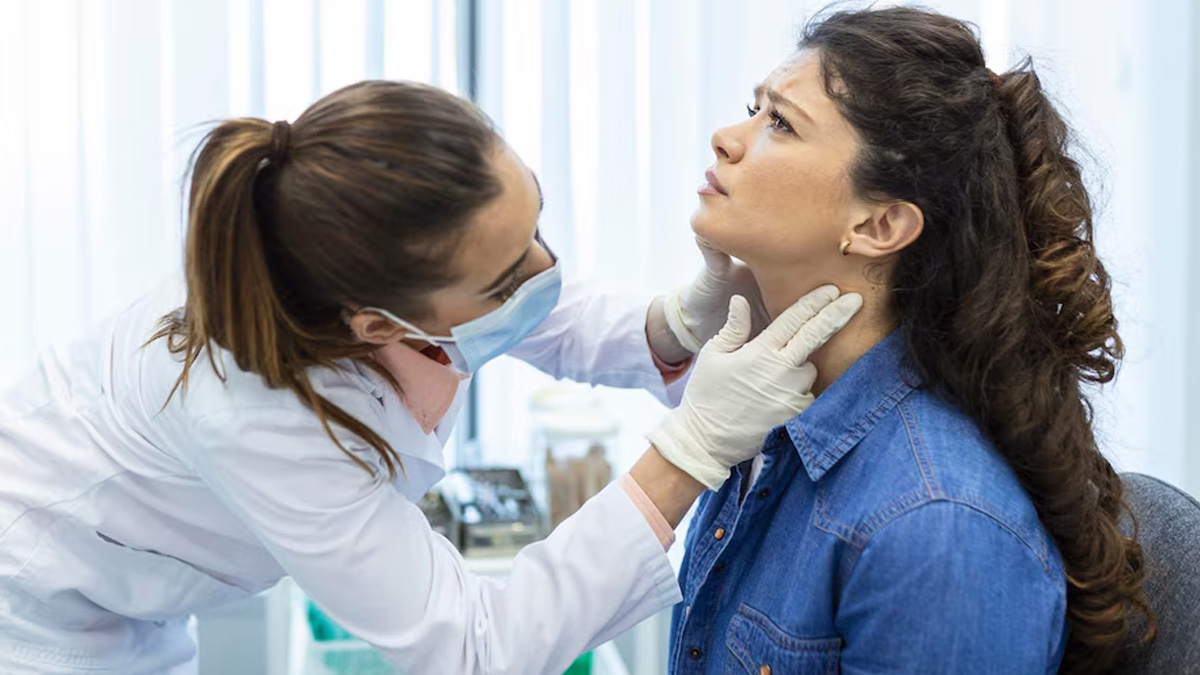
Premenstrual Syndrome (PMS) is a frustrating reality for many women. Over 90% experience some form of PMS symptom, like bloating, headaches, and irritability, in the week or two leading up to their period, according to the Office on Women's Health. Other discomforts include breast tenderness, muscle aches, and even breakouts.
Table of Content:-
The exact cause of PMS remains unknown, but hormonal changes during the menstrual cycle are prime suspects. Interestingly, thyroid problems can also cause similar symptoms like fatigue, mood swings, and muscle aches. This connection raises a question: could undiagnosed thyroid issues be contributing to some women's PMS experiences? Perhaps women experiencing particularly bothersome PMS symptoms might want to consider getting their thyroid function checked. Let's take a look at what an expert has to say.
Also Read: Premenstrual Syndrome: Definition And 6 Tips For Management
Should Women With PMS Get Their Thyroid Checked?

In an interaction with the OnlyMyHealth team, Dr Ashwin Shetty, Consultant, Obstetrics and Gynaecology, Sir HN Reliance Foundation Hospital, says, “Women with intense PMS should consider getting their thyroids checked. Intense PMS symptoms can sometimes mimic those of thyroid disorders, and checking thyroid function can help rule out or confirm an underlying thyroid issue, which can be managed with appropriate treatment. It is generally recommended to get a thyroid check annually or as advised by a healthcare provider.”
Symptoms Of PMS That Can Overlap With Thyroid Problems
Here are some of the symptoms of PMS that can overlap with thyroid problems:
- Fatigue
- Mood swings
- Depression
- Weight changes
It is important to note that this overlap can make it challenging to differentiate between the two without proper testing, Dr Shetty highlights.
Can Thyroid Function Impact PMS Symptoms?

According to Dr Shetty, thyroid function can impact the severity of PMS symptoms.
He says, "Hypothyroidism (underactive thyroid) can exacerbate PMS symptoms like fatigue, depression, and weight gain. Hyperthyroidism (overactive thyroid) can cause increased anxiety, irritability, and menstrual irregularities."
A study published in the journal Paediatric and Perinatal Epidemiology found that even in women with healthy thyroid function, there were subtle differences in menstrual cycles depending on their thyroid hormone levels.
Specifically, women with higher levels of the thyroid hormone T4 had higher levels of oestrogen and progesterone during their cycles, which impacted their PMS symptoms.
Therefore, proper thyroid function is essential for hormonal balance, which in turn affects PMS symptoms, reiterates Dr Shetty.
Also Read: Managing Thyroid Health With Diet: Expert Explains How Diet Can Help Optimise Your Thyroid Health
Risk Factors For Thyroid Problems

Several risk factors can make women with PMS more likely to have an underlying thyroid condition. These include:
- A family history of thyroid disease
- Presence of other autoimmune conditions
- Age (especially women over 35)
- Certain lifestyle factors, like high stress levels and a poor diet
To detect the condition, you can get a blood test to measure thyroid function. This includes the Thyroid Stimulating Hormone (TSH) test, as well as free T4 and free T3 tests. These tests help in assessing the overall function of the thyroid gland and identifying any abnormalities.
Lifestyle Changes To Consider
Several lifestyle changes can benefit both PMS and thyroid health. These include:
- Adequate intake of nutrients like iodine, selenium, and zinc for thyroid health, and magnesium and vitamin B6.
- Regular exercise is important for weight management, reducing stress, and improving mood.
- Stress management techniques such as yoga, meditation, and mindfulness.
- 7-9 hours of quality sleep per night.
- Avoiding smoking and excessive alcohol consumption
[Disclaimer: This article is for informational purposes only. Hence, we advise you to consult your doctor if you are dealing with any health issues to get the necessary treatment.]
Also watch this video
How we keep this article up to date:
We work with experts and keep a close eye on the latest in health and wellness. Whenever there is a new research or helpful information, we update our articles with accurate and useful advice.
Current Version